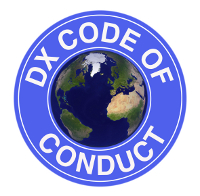 From The Northern California DX Foundation
From The Northern California DX Foundation
You may have heard about the DX Code of Conduct (www.dx-code.org), but you might not know its history or the current state of the project. The genesis was DX Etiquette, an article that appeared in QST early in 2010. It aroused a groundswell of support and people asking, “Why can’t we do something about it?” So we did. A small committee of world renowned DXers got behind the idea of developing suggestions about how to promote ethically based operating.
These were not new; in fact The Amateur’s Code (Creed) was formulated in 1928. ON4UN and ON4WW even wrote a book about it. We wanted to revitalize the concept of good sportsmanship and carry that message to every DXer in the world. Accordingly, our first objective was to translate the code into other languages, currently 35, enough so that every operator can find it in a language he can read. At the same time, we spread the word to the various clubs around the world. Our next objective was to get the DXpeditions on board. After all, as pileup behavior improves, the DXpedition operators are the prime beneficiaries; they have more fun. The same holds true with the DXers at the other end. Operators returning home tell us we are making a difference. We also want to help every DXpedition operator become fully proficient in pileup management skills.
We have received help from Hams who have been on many DXpeditions who have helped create a portion of our website with suggestions that every team leader can use for training newer operators. Promoting ethics isn’t the easiest of tasks. In fact, it can seem rather stuffy, as if we are preaching to people. The term “good sportsmanship” seems easier to swallow than ethics. We hope each operator will see the logic and say, “That’s what I believe too.” With that attitude comes support, and with that support the Ham radio community will be the beneficiary.
The Code
- I will listen, and listen, and then listen again before calling.
- I will only call if I can copy the DX station properly.
- I will not trust the DX cluster and will be sure of the DX station’s call sign before calling.
- I will not interfere with the DX station nor anyone calling and will never
- tune up on the DX frequency or in the QSX slot.
- I will wait for the DX station to end a contact before I call.
- I will always send my full call sign.
- I will call and then listen for a reasonable interval. I will not call continuously.
- I will not transmit when the DX operator calls another call sign, not mine.
- I will not transmit when the DX operator queries a call sign not like mine.
- I will not transmit when the DX station requests geographic areas other than mine.
- When the DX operator calls me, I will not repeat my call sign unless I think he has copied it incorrectly.
- I will be thankful if and when I do make a contact.
- I will respect my fellow hams and conduct myself so as to earn their respect.
